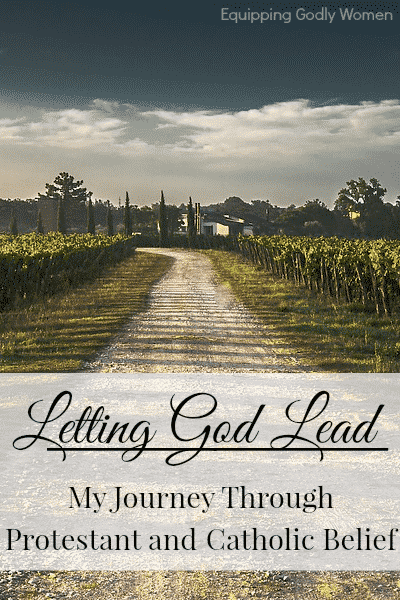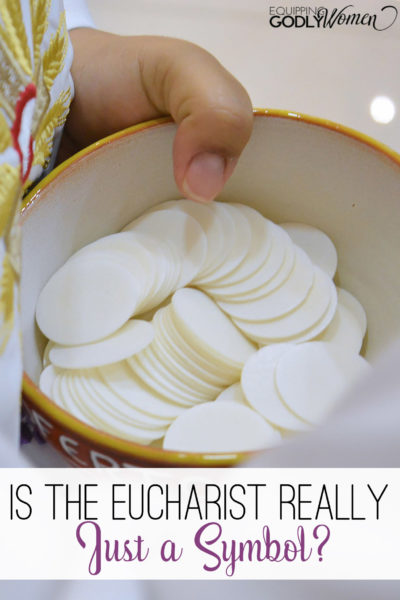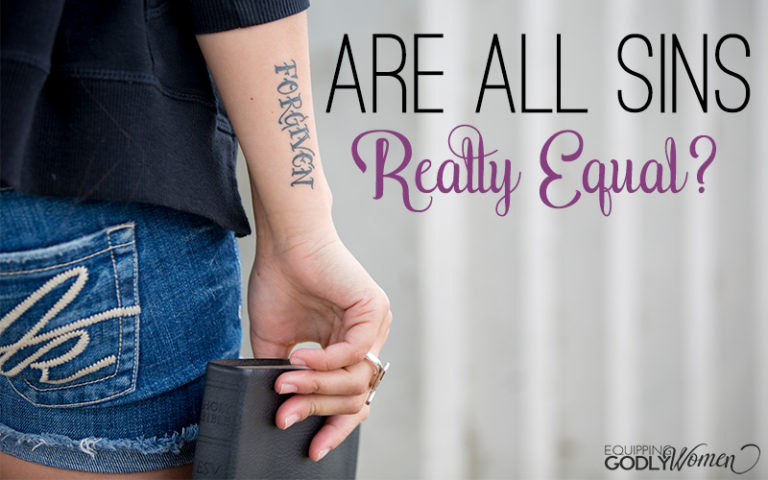Is the Eucharist Really Just a Symbol? 5 Convincing Proofs that Say that It’s Not
This post is post 3 in a series entitled Letting God Lead: My Journey Through Protestant and Catholic Beliefs. While you certainly can read this post by itself, I highly encourage you to check out the rest of the series as well. Find more about this series and a list of all of posts here. This post contains affiliate links.
The first blow to my old Protestant belief system was a big one, and one I wasn’t expecting. As I was reading along in the book Surprised by Truth, one section jumped right off the page and stopped me right in my tracks:
“Writing to the church at Smyrna, a major Christian center in Asia Minor, Ignatius condemned heretics who denied that Christ had an actual physical body… To refute them, Ignatius wrote “They [the heretics] even absent themselves from the Eucharist and public prayers [cf. Acts 2:42], because they will not admit that the Eucharist is the flesh of our Savior Jesus Christ which suffered for our sins and which the Father in his goodness afterwards raised up again.”
Now, I’d had Catholics tell me that Jesus’s words “This is my body” and “This is my blood” were literal before, but not one of them could ever give me a single solid reason why I should believe it other than because that’s what they *thought* the words meant. Well… that’s not a very good argument. They thought it meant one thing–I thought it meant another. So… not exactly convincing.
You see, Jesus spoke in parables all the time, I reasoned. Therefore, the most logical conclusion was that this was simply another metaphor too. Just like how he said he was the vine and the door. Metaphors.
Except that once I started researching further, I started to discover things I never knew before. And in the course of my research, I found five very convincing reasons why the Eucharist must be none other than the real body and blood. Maybe they’ll convince you too?
[thrive_leads id=’23166′]
1. The Early Church Believed It
I’ve always thought that if anyone had a chance of getting it right, it was the early church. After all, they were the ones who heard it straight from the source.
Take Ignatius, for example (author of the quote above). Ignatius was the first bishop of Antioch (the city were Jesus’ followers were first called Christians) and he studied under the apostle John (the one that wrote the Gospel of John). I’d say he would probably be a pretty reliable source! And yet, here he was writing about the real presence of the Eucharist as though it were common knowledge only 10 to 15 years after the apostle John’s death! That’s not a lot of time to get the message mixed up.
You don’t just have to take his word for it though. Apparently all of the early church fathers believed in the real presence of the Lord in the Eucharist. In fact, the doctrine was never seriously questioned until the 11th century. Hmmm…. Did not know that.
Given the choice between what my pastor says today and the beliefs of the first (and second, and third…) century church… well that’s a pretty strong argument. And it’s not the only one.
2. The Jews Couldn’t Accept It
Another thing I never realized: The “this is my body… this is my blood” passage you read in Luke… it isn’t the only time when Jesus talks about being the bread of life.
I won’t retype the entire passage here, but I strongly encourage you to look up and read John 6:22-71 (link for your convenience). In it, Jesus has a lengthy discussion with the Jews in which he compares the manna the Israelites ate in the desert and the bread of eternal life that God offers today. The Jews are understandably very confused, but Jesus just keeps repeating the same thing over and over again.
“Jesus said to them, “I am the bread of life; whoever comes to me will never hunger, and whoever believes in me will never thirst.” –John 6:33
“I am the bread of life. Your ancestors ate the manna in the desert, but they died; this is the bread that comes down from heaven so that one may eat it and not die. I am the living bread that came down from heaven; whoever eats this bread will live forever; and the bread that I will give is my flesh for the life of the world.” –John 6:48-51
“Jesus said to them, ‘Amen, amen, I say to you, unless you eat the flesh of the Son of Man and drink his blood, you do not have life within you. Whoever eats my flesh and drinks my blood has eternal life, and I will raise him on the last day. For my flesh is true food, and my blood is true drink. Whoever eats my flesh and drinks my blood remains in me and I in him.'” –John 6:53-56.
But where it REALLY gets interesting is the Jews’ reaction after the fact. In verse 66, it records that “many [of] his disciples returned to their former way of life and no longer accompanied him.” Would they leave over a mere symbol? Seems doubtful. So I’m guessing that the Jewish people knew Jesus was being literal, even if they didn’t really understand it.
3. Jesus’s Use of the Greek Word “Trogon”
While having the ability to read the Bible in English is wonderful; it does come with some limitations. One of which is the fact that some things are lost in translation.
What you DON’T notice when reading the passage above is that when Jesus talks about eating, he is actually using two separate verbs. At first, he uses the Greek word “phagon” which is the normal Greek word for “to eat.” Part way through the passage, however, he suddenly switches to the word “trogon,” which literally means to crunch or gnaw.
Jesus wasn’t telling them to “partake” or “consume.” He was saying they literally had to crunch, gnaw or chew. (Kind of hard to “crunch” on a symbol… but you can try!) Furthermore, the tense of the word “trogon” implies that this is an action that will take place continuously over time–not as a one-time event.
4. The Eucharist Comes with a Strong Warning
Fast forward to 1 Corinthians, and you’ll find this strongly worded passage:
“Therefore, whoever eats the bread or drinks the cup of the Lord unworthily will have to answer for the body and blood of the Lord… For anyone who eats and drinks without discerning the body, eats and drinks judgement on himself. That is why many among you are ill and infirm, and a considerable number are dying.” –1 Corinthians 11:27, 29-30
Since when do mere symbols come with death penalties?
5. Eucharistic Miracles
Before a few weeks ago, I never even knew there was such a thing as Eucharistic miracles. At first I was very skeptical–because how could you even prove something like this? But from what I can tell at least SOME of the miracles are VERY well documented, scientific and hard to dispute.
This video on the Eucharistic Miracle of Lanciano was my favorite by far. It’s not gross (Some of them are gross! Is it bad to say that?), but it is based on science and facts, and it’s really interesting!!
https://www.youtube.com/watch?v=WeIz4UGI_Zc
Well, there you have it, folks. These aren’t the only reasons–I actually came up with a few more–but if you believe in the Bible and these arguments don’t convince you (or at least cause you to question!), then I don’t know what will!
And now to answer a few of the burning questions you’ve been asking…
What do Catholics Believe About the Holy Eucharist?
In brief:
- The Holy Eucharist is the real body and blood of Jesus Christ in substance, even though still unleavened bread and wine in appearance. This is called “transubstantiation.”
- The elements become the body and blood at the moment when the priest says the words “This is my body” *poof!* and “This is my blood” *poof!*
- They stay the real body and blood as long as they keep their same form. (Once you digest them, they aren’t anymore.)
- Taking the Eucharist offers forgiveness for minor (venial) sins, but not major (mortal) sins. If you are in a state of mortal sin, you should not take the Eucharist until after you go to confession. (Venial/Mortal sins and confession are all topics for another day)
- Jesus is wholly present in equal amounts whether you have one speck of either the unleavened bread OR the wine or if you have a huge helping of both. Same amount of Jesus. (See the video above. That was awesome.)
Why Can’t Protestants Take Part in the Eucharist in a Catholic Church?
At Protestant churches, all Christians are welcome to receive the communion, yet at Catholic churches, only Catholics can. Why is that?
Well, contrary to popular belief, Catholics aren’t discriminating against non-Catholics. Instead, the main reason is that Catholics recognize the Eucharist as the true body and blood, and so they don’t just hand it out to people who don’t believe in it or who might treat it without the reverence and respect that it deserves.
Most Protestants do not believe that the Eucharist is the true body and blood–but only a symbol–and so for a Protestant to take the Eucharist without believing in it would be considered eating without discerning–a very serious offense according to 1 Corinthians 11:29.
Secondly, according to 1 Corinthians 11:16-17, everyone who participates does so in fellowship as part of a whole, unified community. (Catholics do not believe mass happens at individual churches, but that there is ONE mass in Heaven and by receiving on Earth, they are participating in the Heavenly mass with God and the angels.) While Catholics would love to welcome Protestants to the table, it would imply a unity that isn’t really there. (Not my rule. Don’t look at me.)
And finally–not all Catholics can participate in the Eucharist either. In order to partake, Catholics and non-Catholics have to be in a state of grace, have to have gone to confessions since their last mortal sin, and some other stuff. Protestants (and many Catholics) don’t meet these guidelines.
So… for those of you who were asking–these are the official reasons. And you should probably go check out these two articles which can explain it much better than I can:
Who Can Receive Communion on Catholic.com
Why Can’t Non-Catholics Take Communion on CatholicBridge.com
So I hope that helps?
Conclusion
I know that the Eucharist is strange and doesn’t make a lot of sense. But honestly, much of Christianity doesn’t make sense when you look at it from a purely logical perspective. (Three persons in one? There has to be blood shed for our sins?) That’s why it takes faith.
But–thankfully for people who need logic too (like me)–it isn’t JUST faith. There are very convincing reasons to believe in it too. And these are my five.
Discussion time! Do you believe the Eucharist is the real body and blood? Why or why not? What questions or concerns do you have?

Enjoyed this post? Don’t miss the rest of the posts in the series!
The Day I Realized My Religion Got it Wrong
10 Common Catholic Church Myths that Critics Believe
Is the Eucharist Really Just a Symbol?
Who has the Ultimate Authority? A Biblical Look at Sola Scriptura
A Brief Look at the History of Christianity
What All Christians Should Know About Priests, the Pope and Confession
What Do Catholics Really Believe About Mary, Saints and Statues?
Infant Baptism or Believer’s Baptism? Which is Correct?
What is Purgatory? What are Indulgences?
Why Do Catholics….? Honest Answers to Your Burning Questions
Protestant and Catholic Beliefs Series Conclusion
Resources
I’m not asking you to believe because I say so. Please DON’T take my word for it! The purpose of this series is only to share what I’ve learned on my journey in order to inspire you to begin a journey of your own. Here are a few helpful resources to get you started.
*This post contains affiliate links, which means if you make a purchase, I may make a small commission at no additional cost to you. Thank you!
Catechism of the Catholic Church
Surprised by Truth: 11 Converts Give Biblical and Historical Reasons for Becoming Catholic by Patrick Madrid
A Concise History of the Catholic Church by Thomas Bokenkotter
What Catholics Believe about John 6 by Tim Staples
Two Minute Answers to Your Questions About the Catholic Faith by CatholicsComeHome.org
Who Can Receive Communion by Robert H. Brom
Why can’t non-Catholics, Evangelicals and Protestant denominations receive Catholic Communion? by CatholicBridge.com








At the end of #2, I think you mean to put that “Jesus was being serious …” instead of “Jesus wasn’t being serious …”.
Thank you! I fixed it!
May I share my Eucharistic Miracle? My mother and I went to Italy last year on a pilgrimage with other members from our church. It was an amazing experience. We went to Lanciano for a quick stop. They were celebrating Mass including vast amounts of the incense. I am allergic to incense to the point that I can’t breathe, not just the tickle in the throat that echoes through the church on Holy Saturday, but the full-on wheezing that comes from constricted airways. We had walked into the Church, found there was Mass and filed as quietly as we could out another door into a courtyard. At an appropriate time in the Mass, again to be as inconspicuous as possible, we filed into a chapel and then behind the altar to see the monstrance. I had to go back into the Church where all the incense was. My mother wanted me to stay outside. Others were also recommending the same. I wanted to see Him. I had dreamed of this trip for over 20 years, ever since I turned back to the Church. It was worth my last breath to me. I insisted. I prayed. “Jesus, let me see you. You are my breath and my life. Let me see you.” I was able to walk into that Church. Lay my hand against the glass and pray. I was able to talk and laugh when I walked out again. Jesus answered my prayers.
Nice! Thanks for sharing!
Just to add to your point #2 – what I find even more convincing than the former believers LEAVING after hearing Jesus’ explanation in John 6 is the fact that He LET them leave! If Jesus meant for this idea to be a SYMBOL, He would have stopped them and explained, “Hey, you misunderstood! It’s just a SYMBOL of my flesh and blood. I didn’t mean it LITERALLY! ” But He did NOT do this. Instead, “Jesus then said to the Twelve, ‘Do you also want to leave?’ Simon Peter answered him, ‘Master, to whom shall we go? You have the words of eternal life.'” BAM!
Thank you for sharing your exciting journey. I am praying for you as you continue to reveal for yourself the beautiful Truth of the Catholic faith. Welcome home!!
.
I’ve heard this argument too. But there are lots of times when Jesus DID let people misunderstand on other points, so I didn’t find it as convincing 🙂 (Had to narrow the list somewhere, right? lol)
And thanks so much for the prayers and the welcome. No promises though. Still on a journey! 🙂
How wonderful to read your three posts thus far. Thank you for letting us in on your journey. I am a recent convert (Dec 2012) who inadvertently started my journey while wishing to disprove Catholic doctrine and beliefs. Having my “list” of things that I “knew” to be wrong in Catholicism, I started reading and researching. After a year (maybe two), my list had dwindled down to nonexistence. Then I started considering, “What if this is all true?” I started looking around for a woman’s Catholic Bible study and began attending. I began going to daily Mass here and there. I began just sitting in Reservation Chapels in different churches and just prayed or read or just sat/knelt there and thought through things. My heart began a longing I was uncertain about. But all the while, I would beg Jesus to guide me and show me the way. I trusted the Holy Spirit to lead me into all truth as He promised. Seven years after my research began, I entered the Church. I came in with eyes wide open and have fallen in love with Jesus more and more if that is even possible. Ever since I have been so glad that I made the choice that I did!
I am excited to follow your journey wherever it leads you. GOD loves us no matter what we choose, yes? But His call is sure and undeniable if we are willing to listen. My prayers will be with you as well, Brittany.
Thanks, so much Beverly! I can definitely use all the prayers I can get as I take this journey publicly! lol I’m not so much concerned about where I end up, but I hope to discover the truth and inspire others to do the same.
Brittany … I have an M.A. in Theology and a Certification in Catechetics from Franciscan University of Steubenville and am currently the Director of Religious Education at my parish. I just found your blog today and thought I should let you know that I’m willing to answer any questions you have as you continue on your journey to learn more about the Catholic faith. I have also been explaining and defending the Catholic faith on my blog since 2006. There is a wealth of material there that may be helpful to you: http://phatcatholic.blogspot.com
Peace of Christ to you!
Thanks! I might just take you up on that!
You wrote: “(Some of them are gross! Is it bad to say that?)”
No! Not bad at all! I remember praying once with the question, “Why don’t You show yourself as flesh, at least? It’s hard to see You when You look like bread.” The answer came, “Because if it looked like flesh, you wouldn’t eat it, silly!” Christ was taking care of us frail humans even in giving us His Body and Blood under the species of bread and wine, rather than as flesh and blood.
And I’m so glad he did!
Wow, what a great post! I’m a cradle Catholic, but it wasn’t until my early 20s that I finally started to explore and understand the Eucharist, with a little bit of help from John 6 and Eucharistic miracles… and needless to say, it has changed my life! I have to commend you for your courage in exploring different teachings of the faith – I have many Protestant friends who just don’t want to talk about “Catholic things” at all!
Also just have to say – Surprised by Truth is such an excellent series! I really recommend Rome Sweet Home by Scott Hahn as well – also a great and well-written conversion story!
Well, as some of the comments come in, I’m starting to question the wisdom of taking this journey in such a public way… (TOTALLY just kidding! lol) I like talking about religion, and the more knowledge and resources we can all get and share the better! I have read Rome Sweet Rome as well 🙂
I think it’s also worth noting as a proof that when Satanists seek to desecrate Christianity, they actually steal the Eucharist from Catholic Masses so that they can have a “Black Mass” – if it were merely a symbol, why not just use their own bread and wine? But they seek specifically to get Communion from Catholics because it is the actual body and blood of Jesus Christ, and the most evil thing to do would be to use Him in a sacrilegious manner.
Also, we Catholics always keep reserved hosts in the tabernacle, which is how Jesus makes good on His promise, “Behold, I am with you always until the end of the age.”
Not only present to use spiritually, but actually, physically present on earth! That’s pretty cool. 🙂
I’ve heard that reasoning too, though it’s not a strong one for me just because–personally I could care less what Satanists believe. The fact that Satanists believe something doesn’t make it any more or less true. (I mean, after all, they believe a LOT of things I DON’T agree with!) I don’t need their endorsement 🙂
And yes, very cool 🙂
People who don’t believe in the Real Presence of Jesus Christ in the Eucharist like to say that Jesus was speaking “metaphorically” when He commanded His disciples to eat His flesh and drink His blood.
Nothing could be further from the truth. Indeed, it is IMPOSSIBLE that Jesus was speaking metaphorically when He said, “Except you eat the flesh of the Son of man and drink His blood, you shall not have LIFE in you…” (John 6:54).
It CANNOT be the case, because the expressions to “eat flesh” and to “drink blood” already had a LONG AND WELL ESTABLISHED METAPHORICAL MEANING for Jews – and, given this metaphorical meaning, just about every person listening to Jesus in John 6 would’ve known that He couldn’t POSSIBLY be speaking METAPHORICALLY about their need to eat His body and drink His blood! (Indeed, that’s precisely why so many of his followers left Him and no longer walked with Him from then on!)
You see, the METAPHORICAL meaning of those expressions (“eat flesh” and “drink blood”), for Jews (and for Arabs – even to this day), is to wage war against a person (“eat his flesh”) and calumniate/do harm to a person (“drink his blood”)!
So, if Jesus had been speaking METAPHORICALLY, He would’ve been talking UTTER NONSENSE! He would’ve been saying, “Unless you wage war against me and do harm to me, you will suffer eternal death!” That’s how ABSURD His words would’ve been! Of course they weren’t absurd, because He wasn’t speaking metaphorically at all!
To put the (LITERAL) meaning of Jesus’ words beyond doubt, there happen to be numerous verses in Scripture itself – containing words spoken by GOD Himself – which amply demonstrate the METAPHORICAL meaning of “eating flesh” and “drinking blood”. Here are a few:
________________________________________
Isaiah 9 (Judgments upon Israel for their sins.)
9:19. By the wrath of the Lord of hosts the land is troubled, and the people shall be as fuel for the fire: no man shall spare his brother.
9:20. And he shall turn to the right hand, and shall be hungry: and shall eat on the left hand, and shall not be filled: every one shall eat the flesh of his own arm: Manasses Ephraim, and Ephraim Manasses, and they together shall be against Juda. (Meaning: they’ll fight against each other, but also fight simultaneously against Juda).
________________________________________
Isaiah 49
49:26. And I will feed thy enemies with their own flesh: and they shall be made drunk with their own blood, as with new wine: (Meaning: they’ll fight and harm/kill each other) and all flesh shall know, that I am the Lord that save thee, and thy Redeemer the Mighty One of Jacob.
________________________________________
Jeremiah 19 (Prophecy of desolation for the Jews)
19:9. And I will feed them with the flesh of their sons, and with the flesh of their daughters: and they shall eat every one the flesh of his friend (Meaning: they’ll turn on each other) in the siege, and in the distress wherewith their enemies, and they that seek their lives, shall straiten them.
________________________________________
Baruch 2
2:2. That the Lord would bring upon us great evils, such as never happened under heaven, as they have come to pass in Jerusalem, according to the things that are written in the law of Moses:
2:3. That a man should eat the flesh of his own son, and the flesh of his own daughter. (Just like Jesus has prophesied for our own times, that over matters of the faith a man will turn against his father, and daughter against her mother, etc… Matt 10:35).
________________________________________
Ezekiel 39
39:17. And thou, O son of man, saith the Lord God, say to every fowl, and to all the birds, and to all the beasts of the field: Assemble yourselves, make haste, come together from every side to my victim, which I slay for you, a great victim upon the mountains of Israel: to eat flesh, and drink blood.
39:18. You shall eat the flesh of the mighty, and you shall drink the blood of the princes of the earth, of rams, and of lambs, and of he goats, and bullocks, and of all that are well fed and fat.
________________________________________
Daniel Chapter 7 (Daniel’s vision of the four beasts, signifying four kingdoms: of God sitting on his throne: and of the opposite kingdoms of Christ and Antichrist.)
7:1. In the first year of Baltasar, king of Babylon, Daniel saw a dream: and the vision of his head was upon his bed: and writing the dream, he comprehended it in a few words: and relating the sum of it in short, he said:
7:2. I saw in my vision by night, and behold the four winds of the heavens strove upon the great sea.
7:3. And four great beasts, different one from another, came up out of the sea.
(Four great beasts. . .Viz., the Chaldean, Persian, Grecian, and Roman empires.)
7:4. The first was like a lioness, and had the wings of an eagle: I beheld till her wings were plucked off, and she was lifted up from the earth, and stood upon her feet as a man, and the heart of a man was given to her.
7:5. And behold another beast, like a bear, stood up on one side: and there were three rows in the mouth thereof, and in the teeth thereof, and thus they said to it: Arise, devour much flesh (Meaning: wage war on these four godless empires).
________________________________________
Micah 3 (For the sins of the rich oppressing the poor, of false prophets flattering for lucre, and of judges perverting justice, Jerusalem and the temple shall be destroyed.)
3:1. And I said: Hear, O ye princes of Jacob, and ye chiefs of the house of Israel: Is it not your part to know judgment,
3:2. You that hate good, and love evil: that violently pluck off their skins from them and their flesh from their bones?
3:3. Who have eaten the flesh of my people (Meaning: persecuted them), and have flayed their skin off them: and have broken, and chopped their bones as for the kettle, and as flesh in the midst of the pot.
________________________________________
Zechariah 11
11:9. And I said: I will not feed you: that which dieth, let it die: and that which is cut off, let it be cut off: and let the rest devour every one the flesh of his neighbour.
11:16. For behold I will raise up a shepherd in the land, who shall not visit what is forsaken, nor seek what is scattered, nor heal what is broken, nor nourish that which standeth, and he shall eat the flesh of the fat ones, and break their hoofs.
________________________________________
Romans 14
14:21. It is good not to eat flesh and not to drink wine (Meaning: have dissensions among yourselves, slander, attack or do harm to each other): nor any thing whereby thy brother is offended or scandalized or made weak.
________________________________________
James 5 (A woe to the rich that oppress the poor. Exhortations to patience and to avoid swearing. Of the anointing the sick, confession of sins and fervour in prayer.)
5:1. Go to now, ye rich men: weep and howl in your miseries, which shall come upon you.
5:2. Your riches are corrupted: and your garments are motheaten.
5:3. Your gold and silver is cankered: and the rust of them shall be for a testimony against you and shall eat your flesh like fire (Meaning: harm you). You have stored up to yourselves wrath against the last days.
Really enjoying this series! <3
Thanks, Haley! I am too 🙂